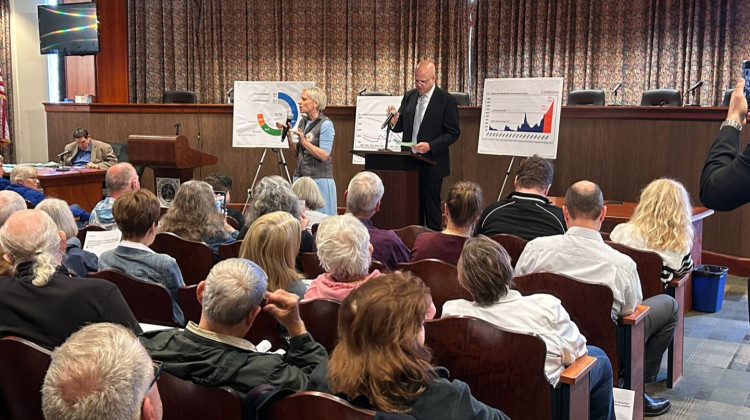A new report from the Animal Welfare Institute says Indiana lags in enforcing humane slaughter rules at small, state-inspected meat plants – that it issues citations, but never stops production.
The Indiana Board of Animal Health took issue with that logic, saying its inspectors are doing their jobs.
Humane slaughter may sound like an oxymoron. But there are federal rules for how slaughterhouses treat food animals – primarily pigs and cows – before harvesting them.
Inspectors stay on-site whenever a plant is slaughtering animals. If they see a violation, they can suspend production for a day or so, or write citations, which don’t carry real penalties.
At plants that only sell meat in-state, Indiana and 26 other states handle those inspections themselves, with funding and oversight from the USDA. Plants that handle meat for sale across state lines are inspected directly by federal officials.
The Animal Welfare Institute gives Indiana’s state inspection program a D grade for enforcement actions. It says Indiana issued eight citations among its state-inspected slaughterhouses from 2010 to 2015, and didn’t suspend production at any plants in the 12 years AWI has studied.
“I would think that the plant personnel wouldn’t be too concerned about humane slaughter violations because there hasn’t been any repercussions from what they do,” says AWI report author Dena Jones.
But Indiana Board of Animal Health spokeswoman Denise Derrer says they don’t feel they need to be more aggressive. Instead, she says they try to be proactive and reduce the need for punitive actions in the first place.
“Our plant owners are educated, aware and practicing right,” Derrer says. “We just don’t have a philosophy here that we’re going to accomplish the most by being the big government agency that automatically comes in and shuts everybody down.”
Derrer says the USDA audits Indiana’s inspection program routinely, and would have revoked funding if it wasn’t working effectively.
“The absence of reports shouldn’t indicate that we are doing something wrong,” she says. “It should be a better indicator that our industry is doing something right, and we don’t have to penalize them.”
Derrer adds that Indiana actually only has about 50 state-inspected slaughterhouses. The AWI’s report uses a higher number, possibly including some processing plants, says Dena Jones.
Jones also says the threat of shutdown is a better incentive at federally-inspected plants, which can lose hundreds of thousands of dollars on a day’s suspension, than at small plants that slaughter less frequently.
Indiana has 21 federally-inspected slaughterhouses for meat and poultry, according to BOAH. At the meat plants, Jones says inspectors stopped production 12 times and issued 72 citations between 2013 and 2015.
About half of those came in 2015, at Tyson Foods’ Logansport slaughterhouse. Jones says it had the worst record of any federal plant in the country that year, but that federal officials intervened and “resolved” the issue after the spike in violations.
 DONATE
DONATE








 Support WFYI. We can't do it without you.
Support WFYI. We can't do it without you.